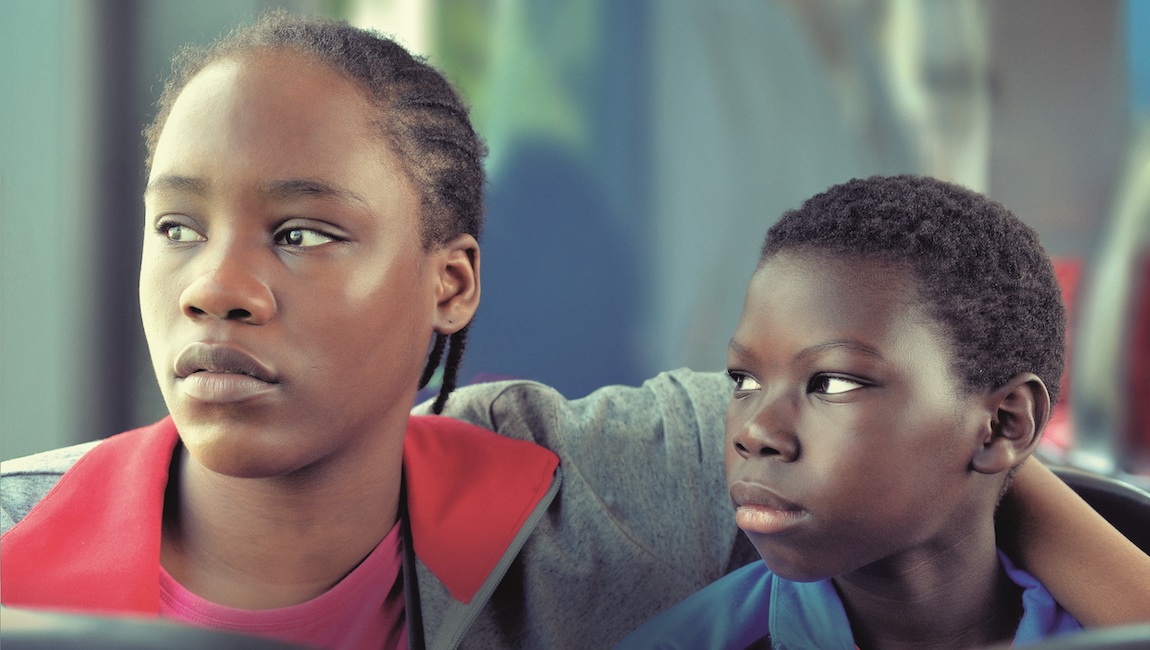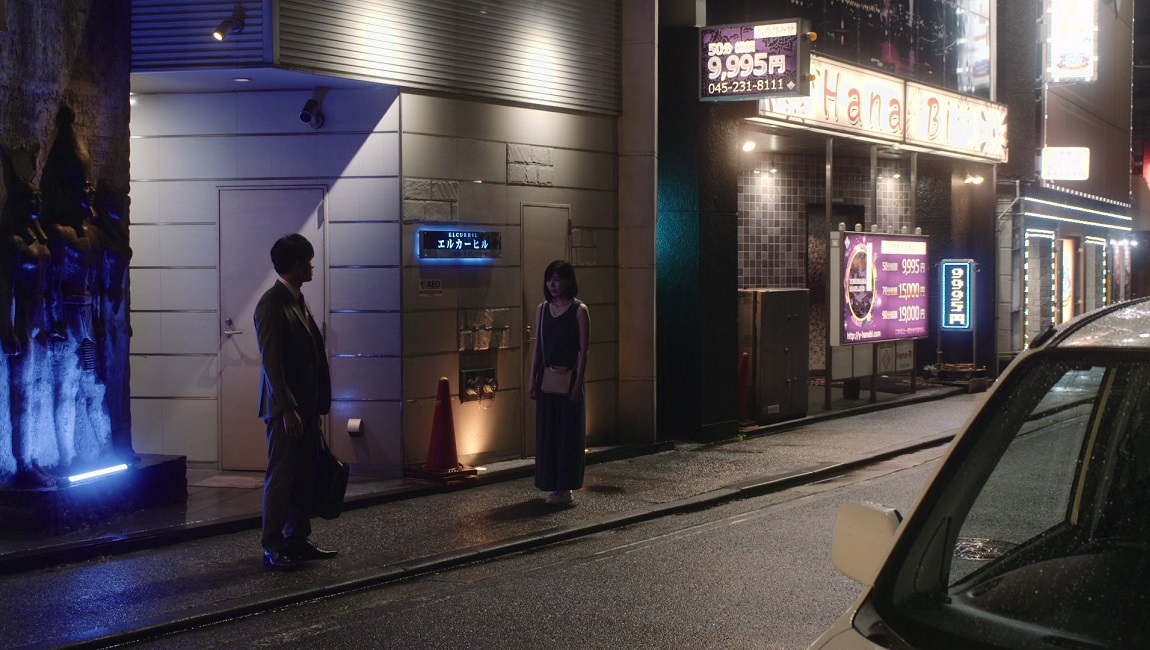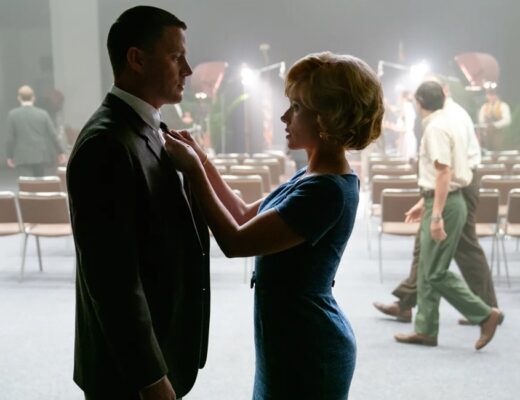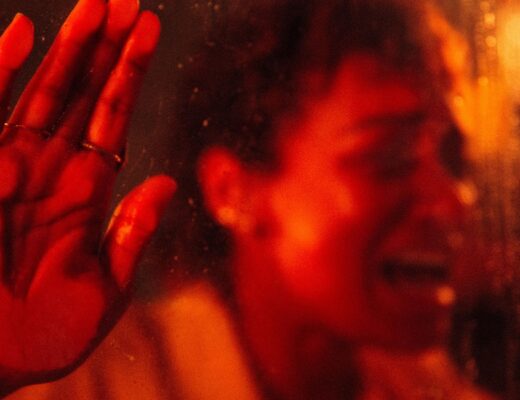Tori and Lokita
Even by their standards, Jean-Pierre and Luc Dardenne’s Tori and Lokita is a relatively to-the-point affair. Set in an unnamed Belgian city, it follows a pair of young immigrants, originally from Benin and Cameroon, who are passing themselves off as brother and sister. When first introduced, 16-year-old Lokita (Joely Mbundu), who doesn’t yet have her papers, is being questioned by officials about how she met 11-year-old Tori (Pablo Schils), who got his papers because he was branded a sorcerer child at birth and thus grew up in an orphanage. During the questioning, we observe Lokita in a nondescript medium shot, which draws our attention — as the Dardennes so often do — to the character’s interiority. From here the film establishes the main details of their lives: that they both deal drugs for a chef, Betim (Alban Ukaj), who is using his restaurant as a cover for his marijuana activities; that he occasionally pays her for sexual favors; that Lokita regularly sends money to her mother in Cameroon; and that she and Tori are periodically shaken down by the couple who brought them to Belgium. In all this, it becomes clear that Tori and Lokita have no one but each other. This bond having been clearly established, the Dardennes then proceed to separate the two: When Lokita’s papers are denied by Belgian officials, she turns to Betim, who offers to arrange some documents in exchange for three months of onsite work in an isolated marijuana greenhouse. The open question of how the pair will respond to this situation drives the remainder of the film’s 88 minutes.
The scenes involving Tori, whose resourcefulness and energy gives the film an energy comparable to The Kid with a Bike, are fairly typical for the Dardennes. Much more unusual, given that their films often rely on characters being in constant motion, are the claustrophobic scenes which follow Lokita in the greenhouse. Atypical, too, is the film’s despairing ending, which features a startlingly uninflected murder and a pointedly concise eulogy. Across their filmography, the Dardennes have demonstrated a keen interest in character transformation, which is why their films so often build to moments of grace and forgiveness, scenes where the exterior viewpoint of the camera takes on the quality of an epiphany. No such moment is forthcoming in Tori and Lokita, which is to some degree exciting in the context of the Dardennes’ filmography, if somewhat flat in the context of the film itself. And after building to a forceful expression of righteous anger, there is nothing left for the film (or the viewer) to do but withdraw.
Writer: Lawrence Garcia
Mother and Son
Léonor Serraille’s Mother and Son is the sort of coming-of-age film that aims to capture life in both small and broad strokes. With a three-part structure that spans a couple decades, Serraille centers each section of the film on a different member of a family — the spirited young mother Rose and her two sons Jean and Ernest — while simultaneously revealing the interconnectedness of their experiences. The film moves chronologically, beginning with the three moving from the Ivory Coast to France, and subsequently adjusting to life as new immigrants. Serraille wanted to make this film after hearing stories from her partner, who emigrated from Africa to France, and while one can see the good intentions throughout, the formulaic approach that often comes from secondhand storytelling is equally present.
Initially, there are maneuvers that establish this particular immigrant experience in a familiar but effective manner. We watch as Rose dances to soukous among family members, and how this jubilant music is contrasted with the regal European classical music that defines her time working. There’s a divide here that’s bolstered by her romantic pursuits: she’s told to date a Black man named Julius Caesar, but resists his come-ons. She opts to sleep with different white men instead, and there’s an underlying but obvious point being made here regarding a desire for comfort in this new place that’s tied up with ideas of personal freedom. “The French take themselves so seriously,” she exclaims at one point. She never feels fully at home.
As the film progresses, these themes become increasingly hamfisted, as if Serraille is trying to ensure that audiences are privy to how the internal worlds of her characters are linked. When the film moves to focusing on Jean, who at this point is a teenager, we watch as he becomes intimate with a white girl as a track from Lambarena’s Bach to Africa plays — its mixing of African music with the works of J.S. Bach is laughably on the nose. Serraille simply can’t help but connect her ideas across the film’s three parts in clumsily overt manners. Early in the film, we watch as Rose and her two sons paint each other’s faces and revel in their time together. But, unhappy with letting that scene live as its own sublime moment, Serraille references it later on when Jean is at a party dancing with the same face paint.
What’s upsetting about Mother and Son‘s constant desire for every action to have a point is that everything feels too labored. Attempts at capturing the family’s racist experiences are painfully executed, and in different ways. We watch a TV news anchor talk about Charles Pasqua, a politician who was largely known for his anti-immigration policies. “The right to enter France must be restricted,” we hear. It’s not insightful or substantive; it’s just a cheap way to get us into Jean’s mind. When the film focuses on Ernest — now an adult working as a philosophy teacher — he gets interrogated by police officers who call him “Mr. Obama.” Mother and Son takes the posture of a film that would slowly reveal intimate, profound complexities, but instead, it remains frustratingly, egregiously simple.
Writer: Joshua Minsoo Kim
Night of the 12th
The team of director Dominik Moll and screenwriter Gilles Marchand broke onto the scene with their first collaboration, 2000’s With a Friend Like Harry… The opening night film at that year’s Cannes, it was also selected for competition, although it was overshadowed by the plethora of masterworks premiering at the festival that year. Nevertheless, it provided a solid showcase for Sergi López as Harry, an old friend of Michel (Laurent Lucas), performing favors for Michel that become increasingly sociopathic. Harry wasn’t much, but it did suggest that Moll might reasonably be an heir to the Chabrol tradition, producing tightly wound thrillers that dissected the bourgeoisie.
The team’s second collaboration, 2005’s Lemming, was not quite as successful, but it did confirm that Moll might evolve into a genre filmmaker of some note. As it happens, he has spent the intervening years spinning his wheels a bit, helming such trifles as The Monk, a bit of Gothic bombast featuring Vincent Cassel in a battle against Satan, and more recently, Only the Animals, a scrambled-chronology policier fixated on chance but beset by contrivance. In light of this, The Night of the 12th is certainly an improvement, although that “next Chabrol” idea continues to recede in the rearview mirror. Like so many films and TV shows these days, Night of the 12th is based on a real crime, and follows the Grenoble investigative squad as they try, and fail, to piece it together.
The victim is Clara (Lula Cotton-Frapier), a 21-year-old woman who was doused with gasoline and lit aflame as she made her way home after a party. The lead detective, Capt. Vivès (Bastien Bouillon), explores the case from various angles, speaking to a host of Clara’s ex-lovers, all of whom seem to have had motive for murdering her. One (Baptiste Perais) insists that Clara was a clinger, and he slept with her out of pity. Another (Jules Porier) was so jealous of her other boyfriends that he recorded a rap cut about burning her alive. Still another (Benjamin Blanchy) claims that Clara kept her trysts with him a secret out of shame. And so it goes.
The main problem with Night of the 12th is that Moll and Marchand (adapting a book by Paula Guéna) seem to think their audience is as incompetent as the police. Every primary theme of the film is stated outright in the dialogue, to make sure we don’t miss anything along the way. An insensitive cop remarks that Clara got around, which prompts the film’s second full discussion regarding victim-blaming and misogyny. And near the film’s end, Vivès remarks to a magistrate (Anouk Grinberg) that, in fact, “all men killed” Clara.
These are not dumb ideas. In a sense, this is the ultimate takeaway from Bruno Dumont’s L’humanité, and Night of the 12th’s concern with the obsessive psychology of damaged cops recalls David Fincher’s Zodiac. But those films understood the power of subtext. The Night of the 12th insists on signposting its every move, to such a degree that Moll doesn’t seem to really need the viewer at all. In the end, this seems to be an investigation that was passed around the precinct until it landed on the desk of Capt. Obvious.
Writer: Michael Sicinski
Butterfly Vision
Perhaps the single most of-the-moment film at 2022’s Cannes, Maksym Nakonechnyi’s Butterfly Vision feels like it could be ripped from tomorrow’s headlines. A gritty war-time drama about living with the trauma of torture, the film begins with POW Lilia (Rita Burkovska) being released in a prisoner exchange between Ukrainian and Russian forces. She is, or was, a drone operator referred to as “Butterfly,” and the film makes it clear that her story has been a hot button issue on Ukrainian television and social media. Reunited with her mother and husband, a fellow soldier named Tokha (Liubomyr Valivots) who witnessed her capture but was powerless to stop it, the film charts both the immediate and long-term impacts of her imprisonment. Nakonechnyi patiently charts the steps of Lilia’s tentative, painful reentry to “normal” life, now irrevocably, aggressively altered.
This is all, needless to say, difficult to watch. Lilia’s mother is elated that her daughter is finally home safe, but smothers her with attention. Tokha is gradually revealed to be a brutish, violent racist who seems mostly annoyed that his wife doesn’t want to be intimate with him anymore. The elephant in the room is whether or not Lilia was raped by her captors, a detail she carefully elides while being debriefed, but which she cannot hide from her obstetrician. Once it is revealed that she’s pregnant, the narrative expands to take in multiple perspectives; Tokha knows it isn’t his, but he and Lilia keep this fact from his mother, while Lilia’s own mother is overjoyed at the prospect of being a grandmother. Throughout, Burkovska gives a fascinatingly opaque performance; it’s never quite clear what she’s thinking, or exactly how she’s feeling. Nakonechnyi occasionally interjects drone footage into the film, which acts to both vary the otherwise staid stylization of the narrative proper while also becoming what could be called theoretical Lilia POV shots. Are these things she saw while piloting? Unfortunately, Nakonechnyi also utilizes quick snippets of flashbacks to Lilia’s torture, signaled by a pixelated digital noise that approximates degraded video images. It’s a striking rough technique, but comes across as an affectation in function. It’s too much effort to situate the film in the “now.” The actual assault is as tastefully handled as such subject matter can be, although one might be forgiven for balking at Lilia’s occasional visions of a CGI butterfly, hyper-literalizing the film’s title. It’s all intermittently affecting, aided by strong performances that carry it a considerable way, but one can’t help but feel like they’ve seen this story before — war is hell, tragedy begets tragedy, and nothing matters except moving on and persevering.
Writer: Daniel Gorman
Falcon Lake
Part coming-of-age tale, part ghost story, Charlotte Le Bon‘s Falcon Lake stands out among its “teenager finds himself over the course of an idyllic summer in the country” counterparts by consistently subverting the tropes of the subgenre. Set in the French countryside, the film follows 13-year-old Bastien (Joseph Engel), who is on holiday for the summer at his family’s vacation home. He becomes enamored with Chloé (Sara Montpetit), the slightly older daughter of a family friend, whose worldly reputation and sharp intelligence belie her own innocence and lack of experience.
The two become fast friends, as Chloé regales Bastien with ghost stories about a boy rumored to have died in the wild part of the lake. While nearby older boys are drawn to Chloé, Bastien finds her awakening something new within himself. But his desire to escape his youth and impress the older boys threatens the delicate balance of the world they have created for themselves. It’s all quite lovely — the hazy cinematography by Kristof Brandl gives the impression of half-remembered dreams, and Le Bon handles potentially tricky material with grace. For a good part of the runtime, Falcon Lake often shies away from the darkness at its heart, undercutting moments of portent with humor so that the audience is disarmed by the time the full weight of its tragedy becomes clear. It’s a deeply satisfying bit of misdirection, which makes its themes of innocence lost all the more haunting because the signs were there all along, ignored by the reverie of youthful summer romance and self-discovery.
Impressive enough on its face, Falcon Lake also doesn’t feel like a typical directorial debut for an actor. While the performances by the young leads feel natural and lived-in, it isn’t realized as an actor’s film in the way that so many actor-turned-director’s movies tend to be. Le Bon displays a strong authorial voice and a keen visual eye, existing in a kind of haunted memory-space that’s both eerie and alluring, often recalling the dreamy visual aesthetic of Alice Rohrwacher. Le Bon eschews the typical sunny idealism and saccharine nostalgia of similarly themed films for something darker and more unsettling — at once warmhearted and heartbreaking, something that boldly acknowledges the deep sorrow of young love through the lens of youthful legends and ghost stories crashing headlong into the real world and upsetting the delicate daydream of adolescence.
Writer: Mattie Lucas









